

Yogi, nonprofit volunteer, Coloradan Jacqueline Johnson
By Kate Stewart NEWS STAFF REPORTERUtah State University student
Jacqueline Johnson is graduating with a bachelor’s degree in human development and family studies. She is also graduating with a double minor in yoga studies and mental health advocacy and awareness.
“How is this actually happening? Like, I’m in shock,” Johnson said in reference to her feelings surrounding graduating.
Johnson said other emotions she has felt include excitement, accomplishment and pride.
Johnson is from Parker, Colorado and has been attending USU since 2017. She decided to go to Utah State because she wanted to live in Utah, and her grandpa graduated from USU.
Johnson started her college experience feeling undecided on her major. She was thinking about elementary education, but after she took a bunch of random classes, she ultimately landed on the human development and family studies major. She said her favorite part of her major is how applicable the material is.
“You go to class and you learn about something, and then you see it in your everyday life,” Johnson said.
Johnson said she wants to be a marriage and family therapist. She plans to attend USU for marriage and family therapy grad school in the fall.
She is married and said she would eventually love to be a mom and try to balance it all.
“This summer, I’m going to New Hampshire with my husband, who has an internship — New Hampshire for two months, and then going back to Utah State,” Johnson said.
Johnson said her grad program will be two years long and there will be 16 total students in the program. “I always did want to do grad school because I really do love school,” Johnson said. “But, I didn’t know if I wanted to do a Ph.D. or a master’s.”
Johnson said she has prepared for her post-graduation plans by being an undergraduate teaching fellow and being involved with research within her department. She said her professor, Diana Meter, has helped get her involved with various outside-of-class research opportunities.


Within her department, Johnson is a member of the council for the Division of Diversity, Equity, and Inclusion.
“I’d say at Utah State, we have less diversity than other places, and so it’s been really cool to think about those issues and be proactive about trying to make an inclusive place for people,” Johnson said.
Outside of her major, she is involved with a local nonprofit organization called Avenues of Hope.
“Their mission, or goal, is to help prevent suicide and to support family members who have had loved ones died by suicide,” Johnson said.
She has been a board member for the last two years, a position that involves running and planning events.
“They use yoga classes for people as a support, and so it was kind of like, all these intersectionality of all the things I love,” Johnson said.
Johnson has enjoyed being a part of these programs, as it has provided her a sense of belonging and the opportunity to be a part of something bigger where she can help others.
“I love the idea of helping people, but sometimes the
idea is a lot harder to actually implement. When someone says, ‘Plan this,’ or, ‘Let’s talk about a survey to help students,’ or whatever, it’s like, ‘Oh, something actionable that I can actually do,’” Johnson said.
Johnson said she loves Utah State for the non-judgemental sense of community it has.
Her favorite memory at USU is from her first year when USU beat Brigham Young University, and the students rushed the field.
She loves spending time outdoors with her friends; her favorite outdoor activities in Logan are rock climbing and doing bonfires.
Her love for yoga comes from her friends encouraging her to sign up for a yoga class during her first year at USU.
“I took a yoga class, and then I kind of just kept taking classes, and I think the teachers in the department are really inspiring,” Johnson said.
Her favorite spot to study on campus is the Sorenson Center.
“It’s like all windows, basically; it’s really bright and light,” she said.
Johnson said her professors are all really cool people who have contributed to her positive experience at Utah State.
“Talk to professors and get involved within the department,” she said, giving advice for other HDFS students.
Johnson acknowledged her professors Darcy Keady, Kevin Barlow and Meter.
“They’ve cared about me as an individual,” Johnson said. “They’ve also helped me with my career goals, and getting into grad school, what to expect, and helping me out with setting up my practicum. They just helped me all round as a person, as a student, as someone who wants to keep going to school.”
USU senior Emma Watts studies stats and snow
 By Alivia Hadfield NEWS STAFF REPORTER
By Alivia Hadfield NEWS STAFF REPORTER
Emma Watts is a Utah State University senior who has been involved in the College of Science and has taken advantage of all snow-related research opportunities.


“I’m super interested in climate application because that’s what my research is in right now,” Watts said.
A highlight of her schooling includes writing a proposal with professor Brennan Bean to the National Oceanic and Atmospheric Administration to study rainon-snow events.
Watts is also involved in a project for the Nevada Department of Transportation collecting stream flow data with statistical programming.
Watts’ work will directly impact how the NDOT designs culverts and other flood mitigation strategies.
“These rain-on-snow events are really dangerous when you’re not prepped, and if your infrastructure design and any other vulnerable areas are not ready to handle that kind of moisture, it’s pretty destructive,” Watts said.
On top of Watts’ research projects, she is currently ending this semester with a 20-credit workload.
Watts is involved in a lot of community service and leads an organization of young women in weekly activities.
“She’s wonderful. She’s really dedicated to understanding her field and how she can benefit the world and people around her,” said Mckay Anderson, her husband.
Watts’ love for math and statistics started in grade school.
She was the math club president at her high school for multiple years and competed in competitions like SkillsUSA. However, it wouldn’t be until her senior year in high school that she decided statistics was what she wanted to do.
“I had a really bad AP statistics teacher who had no idea what he was talking about,” Watts laughed. “I put a lot of effort into that class, like on my own time, and I ended up loving it. When I found out there was a joint degree up here, so you could study both simultaneously, I was like, ‘I’m doing that.’”
Watts was also involved in a start-up rock band, where she played the keyboard and
sync backup. Watts and her band would perform at places like the Velour Live Music Gallery in Provo.
“It was so fun, but that’s since been disbanded,” Watts said.
Watts comes from a big family. She has seven siblings, including her younger sister, who has a rare disease called WolfHirschhorn syndrome.
“Some of the defining characteristics is that she’s super short — 4 feet, 7 inches — and nonverbal,” Watts said. “She has her own little language that she speaks.”
Watts and her sister became super close when Watts participated in respite care before her mission for The Church of Jesus Christ of Latter-day Saints. However, when Watts left for her mission, her little sister didn’t know where she went.
“To her, I was just gone. My sister probably thought I was dead,” Watts said. “When I could call for Christmas, and she saw my face, she freaked out. It’s just super awesome. She is the coolest person ever — she is just so sweet.”
Watts said her sister’s role in her personal growth and education is special.
“She’s going to be a very successful person, not only in her career, but with
her family and helping to raise her kids,” Anderson said.
Watts is starting graduate school next semester and is starting her thesis this summer. Watts plans to further her research on climate application with Dr. Bean. She hopes to one day work for the National Security Agency doing data analysis.
Alivia Hadfield is a first-year student and loves being an Aggie. Her other passions include songwriting, reading and competing in pageants.
— alivia.hadfield@usu.edu
Katie Siesel combining work, play through natural resources
By Savannah Burnard NEWS STAFF REPORTERSitting in her office in the Natural Resources Building, Katie Siesel beamed from ear to ear as she talked about her avid love for skiing, bicycling and an excursion as a rafting leader down Cataract Canyon. Surrounded by potted trees and plants, Siesel laughed as she recalled her memories of outdoor recreation as a child.
Raised in San Diego, California, Siesel said apart from day hikes and trips to the beach, she didn’t grow up doing a lot of outdoor recreation.
“We would always play outside with bikes and stuff, but we never went camping or anything like that, so no one really knows where her desire for all this outdoorsy stuff came from,” said Leeann Siesel, her older sister by two years.
Katie said she was a very high-achieving child, and so most of her weeks were filled with soccer competitions or homework.
“I think I was so focused on wanting to be an engineer, and I had all these grand plans for myself. I wanted to go to a very prestigious college. Then I kind of realized that I wasn’t really happy,” Katie said. After taking and loving an advanced placement

environmental science class in high school, Katie realized she always wanted to be outside and do outdoor recreation — she just never had the chance. With encouragement from her teacher, she started to look at natural resources.
“I kind of found like, ‘Oh, natural resources is a really great combination of work and play where you work outside,’ and I wanted to make the world a better place,” Katie said. “I love science and ecology and people, and it’s a lovely intersection of all those things.”
After graduating from high school, she decided to move to Logan to pursue a degree in conservation and restoration ecology with a minor in watershed sciences.
Siesel attributes her ability to move to an entirely new state to her personality and her habit of stepping out of her comfort zone.
“I do things that scare me, whether it’s like, becoming a raft guide, which I had never done before and it scared the living daylights out of me,” Katie said. “Even just moving out of state to college or jumping into things kind of headfirst.”
Katie said she thinks of herself as a brave, ambitious person and said those traits have helped put her in spaces where she has been able to grow.
Leeann said Katie has always gone after what she wants, and even from a young age, she wasn’t afraid to be herself and stand out.
“When we were in elementary school, she would always wear these crazy knee-high socks. Some would be rainbow colored, others had soccer balls on them,” Leeann said.
Leeann said she thinks Katie’s authenticity has carried over into adulthood and helped her as an adult in pursuing her own passions and accomplishing goals. One accomplishment Katie is proud of is helping run the internship program within the Quinney College of Natural Resources.
After the previous adviser holding the position left, Katie took over. Katie said the role isn’t typically taken on by a student, but the previous adviser felt like it would be a good challenge for her.
“It’s really cool to be like, ‘Oh, because of all the work I did, all these people now can have these really cool opportunities over the summer,’” Katie said. Not only has Katie been a mentor and adviser to students in the QCNR, but she has also held leadership positions as a member of the Alpha Chi Omega sorority.
“It’s unexpected, I know,” Katie said. “But I think that because I’m like, slightly above average in a lot
of different ways, it has really aided me in some of the work that I’ve been doing, so I appreciate my flexibility and being able to navigate a lot of different kinds of situations.”
Katie said she works a lot with the executive board of Alpha Chi on their philanthropy, domestic abuse prevention. She said she participates in bonding activities like paint nights with other sorority members.
Another challenge Katie took on was to help plan the QCNR camp in the fall of 2022. She said during the pandemic, students were struggling to find opportunities because they weren’t able to take any field-based courses.
Katie said she wanted to help students gain experience they could put on their resumes, so she worked with others in the college to plan a fully-funded trip for students to spend a weekend in the canyon and learn field skills.

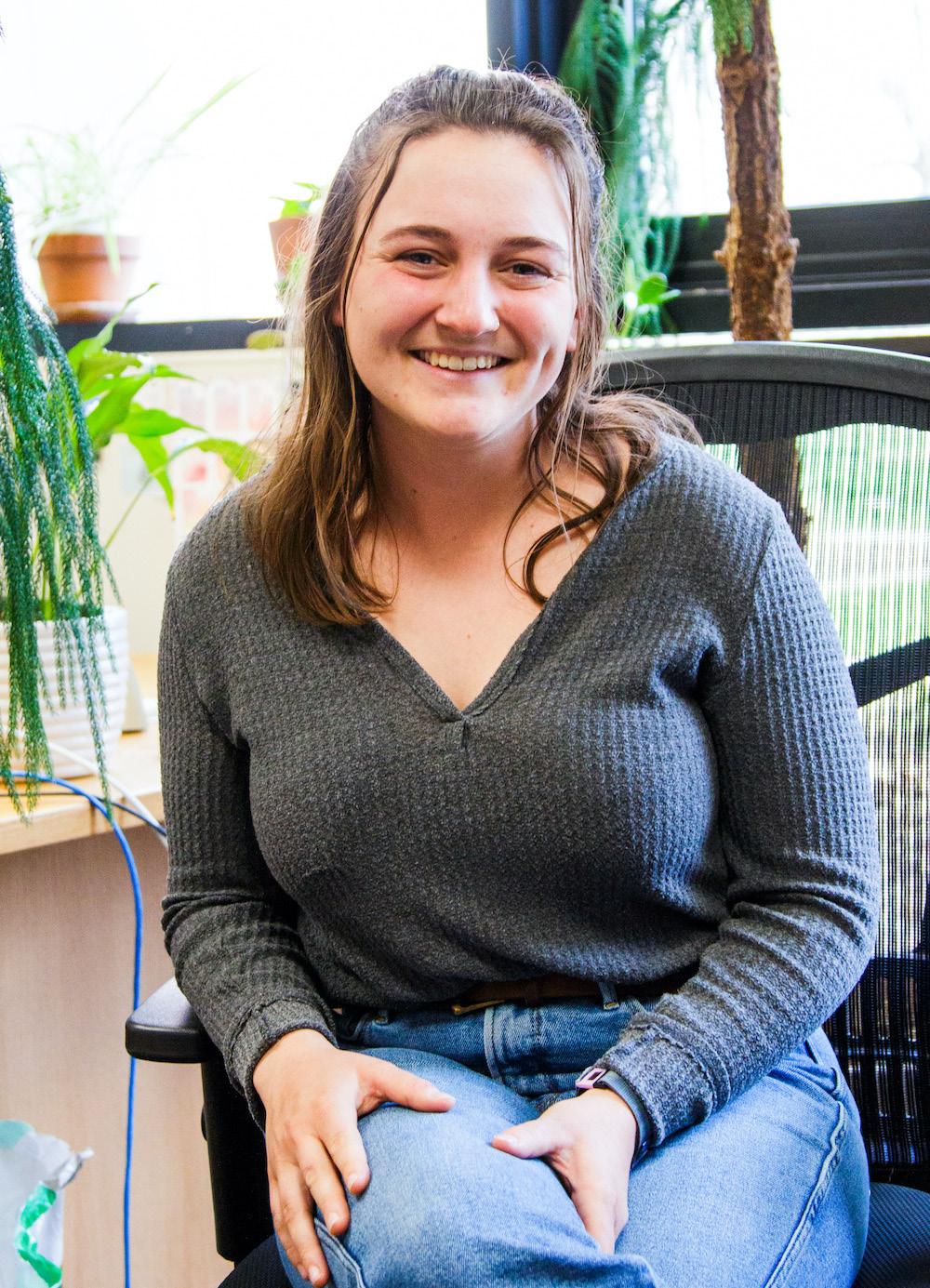


Not only did Katie help plan the QCNR camp, but Nate Crawford, a friend and fellow QCNR student council member, said she volunteered to be the chef for the trip.
“She was an amazing cook with a kickass attitude and not even the rain could bring her down,” Crawford wrote in an email to the Statesman.
Katie said cooking is one of her favorite things to do and her favorite dish to make is homemade pasta and sauce.
“If I have a free day on the weekend, I love to just make a really stupidly complicated recipe for no reason. Because I really like it and I love shar-
Katie said her true passion in life is human con -
nection.
“What makes me happy is not necessarily like my career or my achievements, it’s the people that I’m around and it’s the cool things I get to do with people I love,” she said. “It’s really cool watching people’s growth, and I’m just glad I get to be part of their journey.”
Mitch Lott: A true-blooded Aggie following in his family’s footsteps
By Andie Allen NEWS STAFF REPORTERMitch Lott, a Utah State University senior from Lehi, never expected to come to USU, even though his grandparents, parents, sister and cousins are all Aggie alumni.
He says his time here, however, has been a fantastic experience from the start.
A large factor in his decision to study at USU was the Huntsman Scholar Program.

Lott was required to take a foundational economics class as part of the program. Before this, he had never taken an economics class before.
He will be graduating from the Huntsman School of Business in economics with a minor in international studies.
According to Lott, the international studies minor has allowed him to learn about issues regarding economics from a different perspective.
After graduation, Lott is moving to Washington, D.C. to work as a research assistant at the Federal Reserve in the international finance division.

“I will help them in their academic research, help with data collection, organizing and cleaning and also working on policy products,” Lott said.
This means Lott will forecast the economies of other advanced nations and use that information to influence American financial policies.
Lott considered going to law school after graduating with his bachelor’s, but he found this opportunity with the Federal Reserve after deciding he wanted to pursue a Ph.D. in economics instead.
According to Lott, many first-year students already know they plan to pursue a PhD in economics. Lott felt as though he were behind because it didn’t become his goal until he was a junior.
Mentors gave Lott advice to pursue programs that were geared to prepare individuals for higher education. The Federal Reserve research assistant opportunity is one of those programs.
“In this rare situation, it was essentially a cold application that came through and turned out well,” he said. Lott went to Capitol Hill and presented his research to the head of the state agency.
His professors were able to set this opportunity up for Lott so he could share research that was directly correlated with the head of the Department of Natural Resources’ projects.
“It was so cool to be able to say I was doing something that actually mattered. People put this in place so he could talk to me and we could share ideas,” Lott said. “The work I’m doing isn’t just checking off boxes for a degree. It was impactful.”
According to Lott, another fantastic experience he had while at USU was his time on the business council. He has been a member since Fall 2020 and has served as president.
Lott says it was difficult to feel involved and connected to other students and professors while school was online due to coronavirus restrictions. When school opened up, he saw it as an opportunity to provide students with something they enjoy.
He wanted to get to know his fellow students more, so he set up a table with the business council where they offered free sodas and asked people about their experiences with USU. His intention was to better understand what they needed to improve on.
He took this advice to the dean’s office, so they could be more connected to the school’s administration.
“The social atmosphere of the Huntsman school and rebuilding it was a big focus we had, and that made it a lot of fun,” Lott said.
He worked to put on events like the annual Huntsman Gala and Taco Tuesday. Lott said almost 450 people attended to socialize and eat tacos.
“To be with people is to feel like the school has a soul again,” Lott said.
People are a driving force in Lott’s life.
“I’m definitely motivated by trying to create a difference in the lives of other people because I feel like that’s
when your work becomes impactful,” he said. Academic anxiety has also pushed him to be as involved and successful in school as he can be. He tends to wonder, “If I don’t take this opportunity now, is it going to be detrimental to me in the future?”
During his time at USU, Lott feared he would not have a job or something to work for after school, so he wanted to take every opportunity while he could.
“I like what I do, and I like to do it well. I hope and try to make a difference for other people,” Lott said. “There is an underlying, crippling anxiety that you have to capture every opportunity that comes your way.”
Despite those fears, Lott said he tries to keep an open mind when planning for his future.
He said his initial reaction is to try and plan for everything, but he wants to relax that mindset. He doesn’t want to force himself into a career just because it was part of the plan.
Looking back on his college experience, he would advise his first-year self to have an open mind.
“I would definitely go back and say, ‘It’s okay. Just go with the flow a little bit. You don’t have to force yourself onto a plan because you just feel like you need something to grasp on to,’” Lott said.
Since being a first-year student, Lott has learned academically and personally. One of the biggest lessons has been to never underestimate his own abilities.
A few years ago, he didn’t consider himself to be a good math student. However, throughout his time in college he pushed himself through many math classes and was successful, despite his initial doubts.
“Never doubt yourself on something just because you feel like you’re not that type of person,” Lott said. “If it’s something you want, then do it. If you work hard and are invested, it will work out for you.”

Victoria Johnson: Capturing life and the afterlife
 By Leah Call
By Leah Call
Victoria Johnson sat at a table in front of the Fine Arts Center, talking about photography, college and home — which is 5,300 miles away.

Born and raised in Brazil, Johnson uprooted their life in 2017 and set new roots as an Aggie at Utah State University, choosing to major in photography and minor in sociology. Their father’s family lives nearby and boasts a long line of Aggies before them.

“I wanted to study out of the country and I’ve just done photography, and one day I was like, ‘Wait, I could just do this for the rest of my life, and I could get paid for it,’” Johnson said.
Johnson said the decision to minor in sociology came naturally after taking the necessary classes for fun without the intention of minoring at all.
“I think what I’ve come to learn this past semester was how important research is and how much it adds to the creative process, and how much it adds to building meaning in work,” Johnson said. “I think just using the tools that I learned in my sociology classes has been really useful and being able to access that when making work about today, politics, people and marginalized identities.”
As their senior thesis, Johnson completed a visual study on funeral homes.
By documenting the interior and how it is decorated and staged, she found it is a stage for the social performance that is a funeral.
“One thing that surprised me was I definitely had this vision of how most people see death, how most people deal with it and how most people deal with the thought of a funeral,” Johnson said. “Through the work and through experiencing loss, I was able to identify that I was projecting, and a lot of that was expectations that I had, which in a similar way is like a lot of the expectations society has on people and how they should grieve. That’s what keeps the cycle of repressing emotions and not being able to openly grieve and just be really sad and experience complex emotions.”
Johnson’s research consisted of photographing funeral homes and talking to people — collecting experiences people have had with funeral homes, and how funeral homes are perceived by the public and in the media.
“It started off with an interest I had, for an unknown reason,” Johnson said. “I am still not really quite sure why I was so drawn to it. And then I experienced a loss, and it grew this sincere admiration and appreciation for the people in the industry. How the funeral directors are, in a way, curators who build or curate funeral homes as installations — as a stage for a social performance. Once the buzz of graduation quiets down, I think I would be
interested in going to other funeral homes, probably more eclectic ones. Now that I have this realization that it’s just an installation, I would like to see some wackier ones and photograph more through that lens.”
Jared Ragland, assistant professor of photography in the Department of Art and Design has worked closely with Johnson and been a mentor to them since he began teaching at USU two years ago.
“Victoria was one of my first students here at USU, so working with them through the earlier analog classes through now at their senior year capstone project has been really special and rewarding,” Ragland said over the phone. “It’s been wonderful to be a part of their growth as an individual and an artist.”
Johnson said by collaborating with others and discussing their research, they were able to get insight and form connections they hadn’t seen before.
“It made me realize that I was probably part of the problem of the general population,” they said. “How I see death and how I think the best way to process it is. But
also it made me empathize more with people, because there’s not really a manual on how to grieve, and unless you go to a lot of therapy, no one really tells you what a good way to deal with it is.”
Johnson’s portfolio website states, “Together the pictures ultimately illustrate how these liminal spaces serve as empty containers for a family’s bereavement and mourning, all while acknowledging the ambiguities and ironies in funerary practices. As such, The body is only a vessel treats funeral homes less as venues for the exhibition of embalmed bodies and more like vessels constructed to fulfill whatever needs of those left behind, documenting how funeral practices aren’t so much a dance with death but a shuffle around it.”
Johnson’s exhibition, “The body is only a vessel,” was on display at the USU Projects Gallery in the Fine Arts Center from Feb. 20 to March 3. Johnson was responsible for every aspect of the show — getting their work together, marketing and advertising, installing the exhibition, the reception and takedown after the exhibition was over.
Kathy Puzey, printmaking professor and department head for the art and design program, was Johnson’s capstone BFA professor, who helps prepare students for their BFA thesis exhibition. Puzey worked with students on the display and installations of the exhibits themselves.
“I’ve taught this class for a number of years, and it’s always great to see these students at the end of their BFA careers,” Puzey said. “To see the work put together in a cohesive manner and seeing them getting ready to take that next step out into the world, and just watching them get ready to embark on their careers. It’s been really fun and impressive to see their development.”
Johnson is graduating in May and will take a year off before continuing to grad school.
Read the rest of this story at usustatesman.com.
— A02395831@usu.edu

Graduate Sione Siaki continuing to inspire
By Tyler BodilyThroughout his academic journey, Sione Siaki has demonstrated exceptional leadership skills, a strong work ethic and a passion for making a positive impact on his community.
Siaki grew up in West Jordan and attended Copper Hills High School. It was during his time in high school that Siaki first discovered his love for community service. He joined a club called People of the Pacific and volunteered weekly at an elementary school.
This experience built a passion for service that has remained with him ever since. Volunteering also gave Siaki leadership skills that would play an important role as he continued his education.
Despite initially not having college in mind, Siaki’s friends enrolled at Utah State University Eastern and convinced him to attend as well.
“It seemed like a good opportunity for me,” Siaki said. “It kind of fell into my lap at a time when I really needed it.”
Siaki had an interest in studying computer science, but this was fleeting. His passion for making a positive impact on his community reflected in his choice of major — sociology with an emphasis in criminal justice.

Throughout his studies, he has gained a deep understanding of social issues and a strong desire to address them.
“We just focus on understanding how people operate in groups,” Siaki said. “And I especially love analyzing minority and under-represented groups.”
Siaki is going on to be an educator and help represent Pacific Islanders in education, who are under-represented in community leadership. He has always said yes to every opportunity, including running for student body president at USU Eastern. He won the title, setting him on the path to influence students and faculty alike.
Each opportunity opened the door for another, sparking his move to the USU Logan campus, where he completed his degree.

“I really have found a love for higher education, so I would love to work in higher education and help get access and resources for under-represented groups in higher education,” Siaki said. “I think I’ve really found and helped create a place where I feel I belong and where my voice matters, and I want to continue that work.”
In addition to his academic achievements and commitment to service, Siaki is also admired by his friends for his outgoing and friendly nature. He is always willing to lend a helping hand and support others.
His sister, Emily Afemata, said Siaki has been involved
in Aggie Radio, the Pacific Student Union and a fraternity. His community projects have included converting a junk yard into a community garden.

“He loves to try new things and really take advantage of this time of his life,” Afemata said. “He has so many accomplishments, and it’s because he never takes anything for granted and he puts his heart in everything he does.”
Siaki’s positive attitude and genuine interest in others has made him a role model to his friends and family.
“He is always the person I call before I make a life-altering decision,” Afemata said.
Siaki’s adventurous spirit is another aspect of his personality that his friends admire.
Tecia Mose recalled times where Siaki had been supportive, including spontaneous trips down to Blanding, hikes and various adventures.
“I really look up to him because he has been so supportive and encouraging of me,” Mose said. “Just a wonderful
and kind person. He just loves to serve everybody and is always doing everything he can for other people.”
Siaki loves to go on hikes and explore the natural beauty of the world around him. Whether it’s hiking in the nearby mountains or traveling to new and exciting destinations, he is always up for an adventure.
Mose said Siaki’s love of adventure is a reflection of his passion for life and his desire to make the most of every opportunity.
As a lifelong friend, Mose has been privy to many personal details of Siaki’s life. She feels while Siaki didn’t have the easiest childhood, his perseverance and willingness to put himself out in the world and put his best into everything he does sets him apart from others.
While at USU Eastern and in Logan, Siaki has had the opportunity to join many groups, including Circles USA as a child and youth worker, UServeUtah as a youth council member and the Utah Student Association as a board member.
Siaki spends a lot of time with others helping them to grow and accomplish the dreams they have, using his own life and accomplishments as inspiration. His constant striving for self-improvement and greatness ensures a positive impact on all he meets.
“He will always give his honest opinion and above anything else, he’ll give you his time,” Afemata said. “He will make you feel heard and validated with just one FaceTime call.”
As Siaki prepares to graduate, he is excited about the opportunities that lie ahead. He hopes to use the knowledge and skills he has gained at USU to make a positive impact on his community and beyond.
“I’m about to walk, which has always been a dream of mine,” Siaki said. “There were so many obstacles that could’ve stopped me, but honestly just getting to this point, and still being able to be the first person in my family to go to college and graduate is a huge deal in itself.”
@mermaidbl00d @jzux

i love saying “sorry i’m out of it today” as though there has ever been a day in the past ten years that i have been “in it”
first date idea: you carry me up the mountain and sing to me while i drink so i can get strong. but if you forget to come back for me, you and your family will be cursed for always and eternity
Guy at work just cracked open the loudest Diet Coke and it made me turn my head and look at him and as he poured it into his mug he said “mating call…..”

The Utah Statesman has highlighted 50 Influential Aggies each year since 2015.

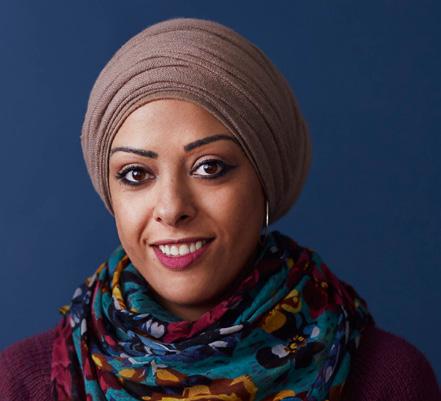









The individuals were nominated by students, faculty and staff on campus, then selected by our editorial staff. The Utah Statesman staff is privileged to honor these people for their contributions to Utah State University.


To view the 50 Influential Aggies from past years, visit usustatesman.com/50-aggies.
















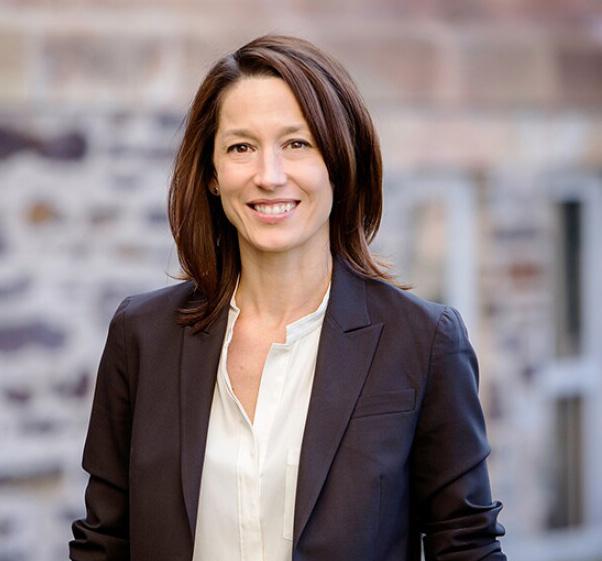


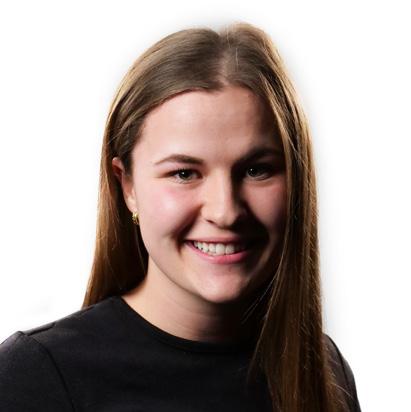














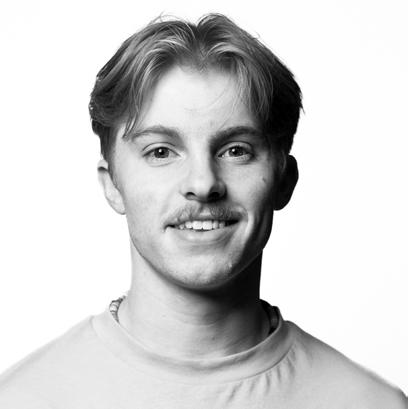




Biological engineering student makes a difference in agriculture
By Caitlin Keith LIFESTYLES STAFF REPORTER“I’ve got the super fancy, whatever new calculator, but it does not do me any good in competing with Melanie,” said Peter Jeppeson, a biological engineering student. “She’s just got this beat-up TI-89 probably from the ‘90s, and she still kicks everybody’s butt.”
Jeppeson met Melanie Mills two years ago while working with her for a group project. He said Mills stands out because of her work ethic and dedication.
“She is totally the epitome of excellence,” Jeppeson said. “She’s super dedicated, super levelheaded and honestly, she’s amazing.”
Mills, who is graduating this May with a degree in biological engineering, currently works full-time at Gossner Foods as a process engineer. When she began applying for internships last October, she was hoping to find something for the summer.
“I called them, and it ended up that this guy had never heard of me — it was a complete cold call,” Mills said. “And I was just in the right place at the right time when they said, ‘Actually, we really need your skill set. We’d love to have you.’”
Mills said she is the only engineer working in the facility of about 650 employees. She was hired to reduce water and milk waste and to increase efficiency.
Biological engineering is a variation of chemical engineering. Mills said it involves thinking about how one can exploit biological systems to accomplish the chemistry that is desired.
Mills, the youngest of eight kids, grew up on her family’s farm in Burley, Idaho. Her family grew potatoes, sugar beets, alfalfa and corn. They also raised beef and dairy cows.
“I grew up with exposure to lots of different aspects of the ag industry,” Mills said. “And I knew I couldn’t be a farmer, but I wanted to stay involved in the industry. So I decided to come to Utah State and study something that would help me be able to give back in the ag industry, and I just decided to study biological engineering.”
Mills has classmates focusing on vaccines, biofuels and prosthetics, but her focus is on agriculture. “Since I’ve started in biological engineering, my goal was always to have the technical skills from engineering to be able to communicate with the technical people in the industry, and then have the agricultural background to be able to communicate with the producers and the shareholders in an ag company,” Mills said.
Mills has been able to start fulfilling this goal in her job at Gossner and will continue to follow this goal as she moves forward in her career.
She is married to Daniel Mills, who she met at a Logan Institute of Religion activity. Daniel is a junior
from western Nebraska studying mechanical engineering.
Daniel said five of Melanie’s strengths are faith, dedication, common sense, kindness and being goal-driven.
“I think she was nominated because she has a specific purpose and goal for her education,” Daniel said. “It’s very common that people aren’t sure what they want to do after graduation.”
Daniel said even though Melanie hasn’t graduated yet, she already has “her dream job.”
When Melanie isn’t studying or working, she enjoys four-wheeling, sewing and watching Duke basketball.


Melanie summed up her childhood in a story when she and her cousins used to take two four-wheelers on either side of a canal with a rope in between them and pull someone with the rope on a kneeboard.
She got a little aggressive, went too fast and pulled the four-wheeler her cousin was driving into the canal. They were able to pull it out of the water and get it running again, but they decided not to tell their parents.
A few months later, the four-wheeler stopped working because water got into the oil and ruined the engine.
“If we would have been honest and upfront in the beginning, we could have just drained the oil,” Melanie said. “My dad probably would have been mad, but it wouldn’t have been a big deal. It taught me two important life lessons. The first is there’s so much to be said about just being upfront and honest. And the other is that you always have to be paying attention in life. Because if you aren’t paying attention, life can pull you in, in different directions.”
If she could give advice to her first-year self and other incoming college students, Melanie said they shouldn’t be pressured into feeling they need to be involved in anything. They should find out what they want to do and follow that path.
She said oftentimes, professors made her feel like she was bound to fail, but she wants new students to know if they are willing to work hard, they can succeed.
“I think something that wasn’t stressed enough was ‘Sure, college is difficult, but it’s not impossible,’” Melanie said. “If you’re willing to work hard, and not just work hard, but use your time efficiently, you can get it done.”
Melanie said the three things she values most in the world are her faith, her family and the ability to laugh.
“I think that’s something that we kind of take for granted in our world, and we almost praise people for being gloomy or say, ‘Oh, my life sucks more than your life,’” Melanie said. “But I think the ability to be happy and find joy where we’re at is a gift.”

Aviation student
Tommi Abbott flies high during years at USU
By Darcy Ritchie MANAGING EDITORTommi Abbott decided she wanted to be a pilot when she was 17 years old. Her cousins went through the aviation program at Utah State University and pushed her to pursue it.

“My cousins had gone here, so I already had a pretty good idea of the professors and what classes I was going to take,” she said. “Then I came here, and then I just fell in love with it.”
Abbott is from Pleasant View, Utah, and she will grad-
uate this year with a professional pilot degree with a fixed wing emphasis and an aviation technology - aviation management degree, which she decided to add last semester.
“It was a total whim,” she said. “I was like, ‘Well, why not? I'm already paying for tuition.’”
This has been an intense semester for Abbot after adding the second degree and working on getting her instructor license, which was delayed because of the weather.
“I was supposed to finish the instructor thing months ago, and the weather was just so bad,” she said. “It just
kept getting pushed and pushed.”
Abbott said the classes to become a flight instructor aren’t hard, but the extra work is “insane.”
“I can't even tell you how much I studied, but I could show you my binder in my car,” Abbott said. “16.6 pounds of all my lessons.”
For the instructor license, she had to complete a minimum of 15 hours of flying, including multiple spin flights, during which a pilot stalls the plane and spins towards the ground. After being endorsed, Abbott completed an intense government-mandated test called a checkride, which can take between three and eight hours
on the ground followed by one to three hours in the air.
Abbott now has her private, instrument, commercial and instructor licenses. She has spent over 330 hours in the air since she started the program. After graduation, she hopes to be a flight instructor at USU or do tours of the Grand Canyon, but her eventual goal is to work for an airline, which would require her to hit 1,000 hours.
Abbott said she is someone who focuses a lot more on school than going to activities or getting involved. She advises new students to have fun at college, and for students in the pilot program to also put in the work and study.
“You definitely need to know your profession because it's not so much ‘Just take a class to pass it’ as much as ‘You need this because someday you're going to be flying people's kids,’” she said. “You need to know how the plane works, and can you safely handle it if something goes bad?”
Abbott’s biggest mentor at USU has been her instructor, Parry "Pee Wee" Winder, who she said took her in as one of his own. He’s helped her meet important people in the aviation industry and increase her own influence on the aviation program.

Abbott is involved with the jet training program at USU, which is the only program of its kind in the state. She taught the jet ground school last semester.
“We teach our students how to actually fly a jet for 48 hours before they even ever touch one, so that they're that much, much more ahead when they go to training,” she said.
Bruce Miller, the department head of Aviation Technology, said Abbott’s work in the jet program sets her apart as an outstanding student and role model.
“She works at our jet training program as basically a mentor for other students,” Miller said. “She is always willing to provide that help, but she's also a non-traditional role model for others.”
Last fall, Abbott also got involved with the Girls in Aviation project at USU, which works with young girls interested in aviation. She was encouraged to join by her sister, Maizy Abbott, who is also in the pilot program.
“It's really cool to help these little girls and show them, ‘Hey, you can do this,’” Abbott said, “because it's so easy for women especially to not feel confident in a male-dominant field.”
Maizy said being in the same program as her sister has been “absolutely incredible.”
“Not only is she such an amazing sister, but she's such an amazing teacher,” Maizy said.
“I've truly been so blessed to have her through it, especially with not very many women in the program.”
She said her sister is one of the most determined people she has ever met.
“There is nothing that stands in her way, and every goal that she sets for herself, she goes above and beyond,” Maizy said. “Not only that, she's so humble and kind and will literally help anybody in need and stop everything to do that for them.”
Miller also recognized Abbott’s willingness to help others — both fellow students and the department as a whole.
“We will miss seeing her,” Miller said. “We're happy to see her go out and be a successful professional.”
Darcy Ritchie is a senior studying journalism and history. While Darcy is currently focused on graduation, she is also navigating her obsession with Disney Princesses and fighting to represent the ginger community.
— darcy.ritchie@usu.edu

Being an Aggie is a ‘family thing’ for Chandler Dolphin
By Jake Ellis SPORTS EDITORBefore his senior year of high school football started in 2016, Chandler Dolphin took a walk with his father around the campus of Utah State University. As a solid offensive line prospect, it was starting to set in that if he performed well enough during his senior season, he could play football for USU just like his uncle Kevin Rice did in the ‘90s.
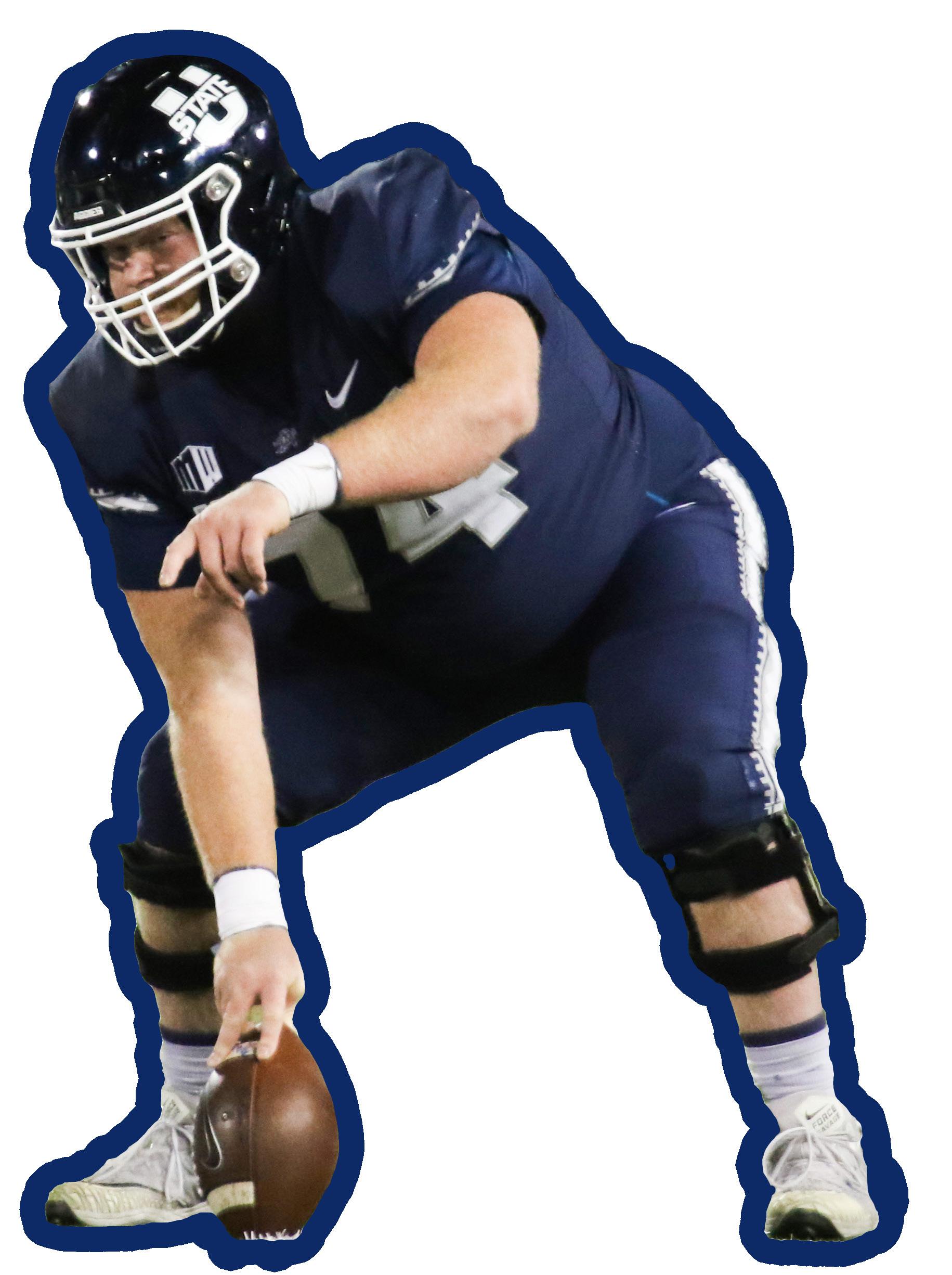
After finishing the season with 55 pancake blocks and being named first team allstate, Dolphin got the offer to Utah State.
“I think the reason I chose Utah State — it was just such a family thing,” Dolphin said. “My parents (Traci and Robert Dolphin) were Ag gies. My uncle Kevin was an Aggie.”
Dolphin said he attended Aggie foot ball and basketball games growing up, and he “just loved the atmosphere.”
Getting the offer to play was huge, but as a preferred walk-on, the path to getting on the field was long and strenuous. Dolphin redshirted his freshman year and then slowly worked his way up the depth chart, playing in seven games for 51 snaps over the next three seasons.
It was hard for Dolphin to grind through years of practice without much time on the field. He thought about quitting sometimes.
“It was a long journey for me, but I think I could definitely say that I bought into... the process of what it takes some times to get on the field,” Dolphin said. “Multiple times where I wanted to quit. Luckily, I had good people in my corner who told me that I wouldn't — It's not the best option for me. It's not a good idea to throw in the towel.”
One of those supporters was his father, Robert Dolphin, who tried to help Chandler see “the long term.”
“I always felt he had it in him. I always felt like there's a great prize, a great end result at the end destination,” Robert said. “So many athletes and so
paign included comeback wins at Washington State and Air Force and a dominating victory over San Diego State in the Mountain West Football Championship game. It culminated with another Power Five victory over Oregon State in the Jimmy Kimmel LA Bowl.
After winning USU its first Mountain West Conference title in football, the Aggies looked to run it back in 2022. However, with widespread injuries and tough defeats, things did not go their way. But after starting the season 1-4, the Aggies fought their way back to 5-5 and defeated San Jose State on senior night in Maverik Stadium to
“That was a really, really big game,” Chandler said. “We played one of our best games of the whole season and to get bowl eligible, have that be my last time playing in Maverik Stadium, having all my family and close friends there, that was something that was — it's one of my core memories of Utah State Football for me in my journey.”
Representing Utah State on the football team and playing in an Aggie jersey is something Chandler is “super grateful for.”
“It's meant everything to me. It's like — I wouldn't trade that experience for the world,” Chandler said. “It's been a phenomenal experience, and I've grown so much as a person, just mentally. It's taught me how to be tough. And you know, each era of Utah State Football has presented a different challenge for me, but it's — each one has been just as enjoyable as the other.”
At the end of the 2022 season, Chandler was named an Honorable Mention All-Mountain West player. But even more impressive to his father, Chandler started D-I football while maintaining a high GPA, securing Academic All-Mountain West honors from the 2020 season through the 2022 slate.
“We’re just so proud of how he did things at school,” Robert said. “I know how hard it is to do that stuff but not play college football. You think of how much time it takes out of college football and to be able to maintain great grades like that, that's just — at the end of the day, we're more proud about his academic accomplishments than anything he does on the field.”
Utilizing his extra time at USU from his five years of football eligibility, Chandler earned a master’s degree in business administration during
this academic year.
Connecting with classmates and professors has been his favorite part of graduate school.

“I will always remember all the group work that I did with all those people and all those classes,” Chandler said. “Group work, presentations, live negotiations with classmates — that's the stuff that I think I remember when I think back at my experience.”
Chandler said he’s had a “phenomenal educational experience” at Utah State.
“Every single professor I had was fantastic,” Chandler said. “Especially in the business school, I think they truly go above and beyond in helping their students. I feel like there's an extra care factor with the professors here at Utah State that I don’t feel like is common at other schools.”
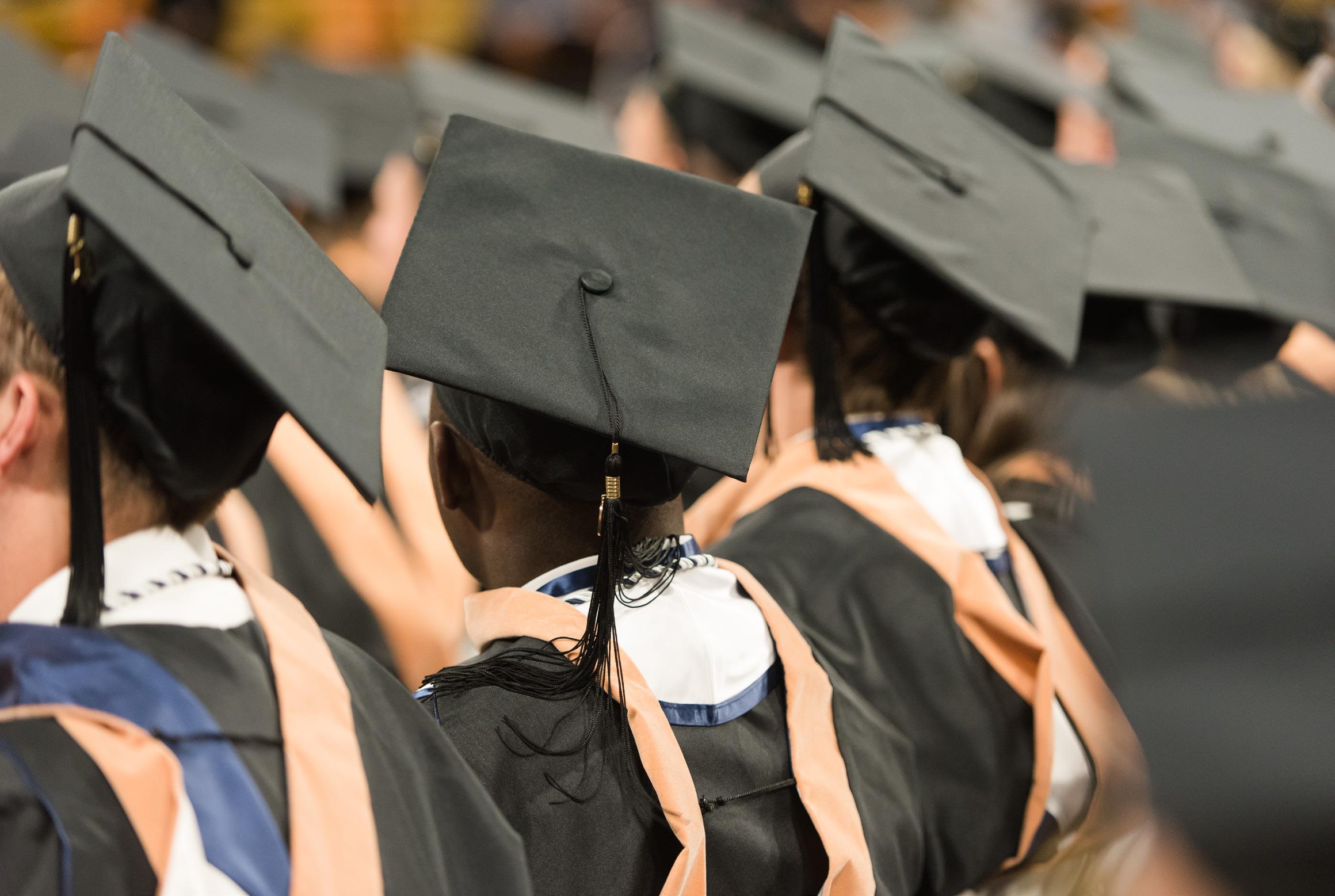

With his degrees and experience from Utah State, Chandler feels prepared for life after USU, whether in the NFL or the business world.
“Utah State in (the) football program taught me how to be mentally tough and deal with adversity,” Chandler said. “To have a degree from Utah State is extremely valuable because it is such a great university. And so for me, I feel like having my degree at Utah State will change the trajectory of my life.”

Finals week fits

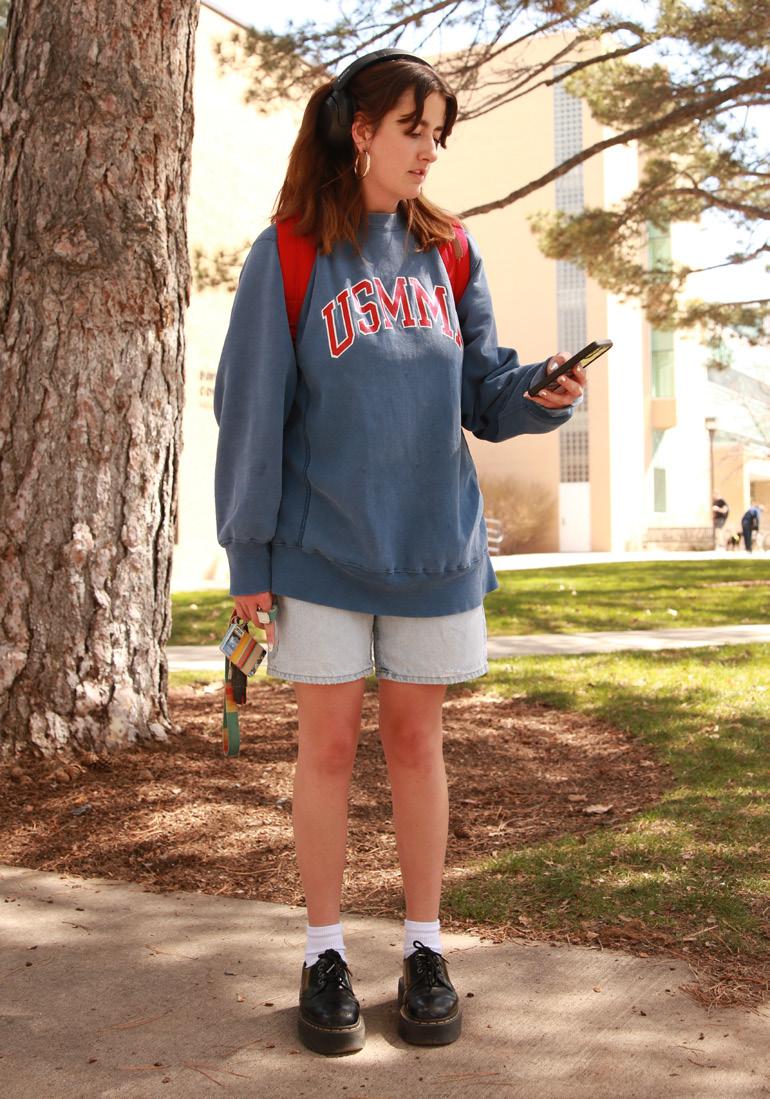


 By Claire Ott STAFF PHOTOGRAPHER
By Claire Ott STAFF PHOTOGRAPHER


Last week’s solution:



Sudoku puzzles are provided by www.sudokuoftheday.com.





